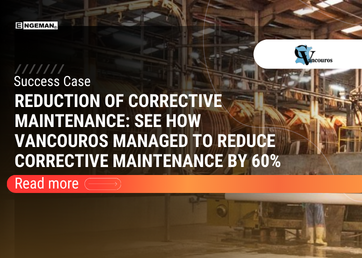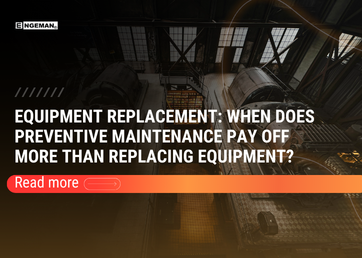Contents
What is the importance of maintenance?
It is a set of activities and resources applied to the equipment, aiming at the best performance; higher production; establishing availability parameters, enabling a safe performance of the work, and with permanent cost reduction.
These are actions necessary for an item to be conserved, adequate, restored, replaced, and prevented in order to remain active, according to a specific condition. Maintenance also helps the company to ensure the quality of its products through the correct operation of its equipment.
Types of maintenance
Nowadays, with the evolution of technology, there are several types of maintenance. It’s no longer possible to do it, as in the old days when maintenance was applied only when the equipment suffered some damage. Imagine the problems that companies face in meeting due deadlines and ensuring the quality of their products. Surreal scenario for our current reality!
It’s also important to know that, despite the several types of maintenance that exist, each company will adapt according to its reality. Some require more investments, but in the long run, they will bring significant profits to investors. Therefore, it’s very important to have trained professionals who know the maintenance routines in depth and thus can successfully manage your company’s maintenance department.
Among the types of maintenance that exist, in this article, we will address some of the most used and most relevant that can help you better understand how maintenance is essential for the success of your business. We highlight:
- Corrective Maintenance: also known in some literature as reactive maintenance, is the oldest that exists. It’s the one that, as its name suggests, enters at a crucial moment in its production, to correct a problem that has already manifested itself. Corrective maintenance is the most used in companies today because it’s the maintenance that will solve a problem that has already set in: equipment downtime.
- Preventive Maintenance: it’s done in predetermined periods or according to the need and criteria in a planned and systematic way. All these actions are aimed at reducing failures, equipment degradation, and employee safety.
- Predictive Maintenance: in predictive maintenance, the strategy of constant monitoring is used through, for example, vibration analysis, ultrasound, inspections, voltage, and electric current, among other factors. With this technique, it is possible to anticipate defects and detect any abnormal operation before an unscheduled downtime occurs. It is one step ahead of the preventive one. Industry 4.0 technologies can be applied to predictive maintenance.
- Total Productive Maintenance: it’s a methodology used in the industry to optimize processes aiming at failure and zero defects. It is of Japanese origin, and its application involves several company departments. Its application, in addition to the benefits in productivity and reliability, develops employees to be more autonomous and have more machine knowledge. It’s the culture of “I take care of my machine” that has been applied in fact in the industry. It has eight pillars and covers several departments within the company. Learn more by following our series of articles on TPM pillars!
- Maintenance Engineering: It’s the area of engineering aimed at designing improvements in machinery and thus obtaining an enhancement of the reliability, availability, and maintainability of equipment.
There is also the Detective and Prescriptive maintenance, which are more current and still little used compared to those mentioned above. To learn more about each type of maintenance, read the article Maintenance Types and learn in detail the importance and the use of each of them.
What is the importance of maintenance routines?
Maintenance must be performed because all equipment, without distinction, has wear and tear that ends up compromising its operation.
The opposite of maintaining equipment frequently can result in critical and often even permanent consequences. Note:
- Increases the corrective maintenance failures;
- Increases the cost of spare parts inventory and own maintenance;
- Causes unnecessary component changes or breakage;
- Unnecessary inspections of equipment in good condition;
- Logger downtime of equipment for maintenance;
- Increased work demand due to corrective maintenance;
- It puts the integrity of users at risk.
Based on the questions I presented, it is not difficult to understand why all discussions about maintenance find their oasis in Preventive.
Planned maintenance is based on a history of breakdowns and observing the reports of periodic reviews.
Why is it important to have good management?
Now that you know the types of maintenance and the importance as well as the application of each one in the industry, it is necessary to make it clear that no knowledge is enough if it is not well executed! Yes, that’s right, the correct execution of each process will only happen if the people involved know how to apply them. Therefore, it is essential to emphasize the importance of good management of maintenance processes.
Performed continuously, maintenance management will be responsible for supervising and controlling all equipment that is directly involved in the company’s production. Efficient management will collaborate with the optimization of equipment, thus avoiding unexpected stops.
It is essential to have expert maintenance management software, which is designed by those who understand maintenance. This step is important and has a great impact on the company’s cost reduction. With the specialist software, the manager will have accurate management reports in hand that will facilitate decision-making. It is also possible to perform maintenance plans according to the qualifications of your employees. The manager does not need to search through spreadsheets or maintenance histories of his equipment to direct his decisions.
Efficient management is a fundamental part of ensuring that all maintenance processes can happen correctly. In this sense, the company will be able to obtain the profits it desires because it has the guarantee that its production will not suffer an unexpected stop or that some equipment will be unusable before the end of its estimated useful life.
What is the importance of maintenance for the industry?
The central idea is to reduce and/or avoid failure or drop in performance, following a previously prepared plan.
Statistical processes are used that determine the average useful life of the components and observe a previously schematized standard.
In the materials on the subject, there is a sentence, without a signature, that says that “Maintenance should not only be that which repairs, but that which eliminates the need to repair.” Of course, repair will always be part of the maintenance team’s routine, but planning must be your faithful companion, otherwise, you will lose a lot of money.
Value the data emitted by your day-to-day, analyze it critically, improve your decision-making capacity, and see production increased and costs reduced. Learn how maintenance management software can help your company optimize and enhance all its processes. Talk to our experts here.




